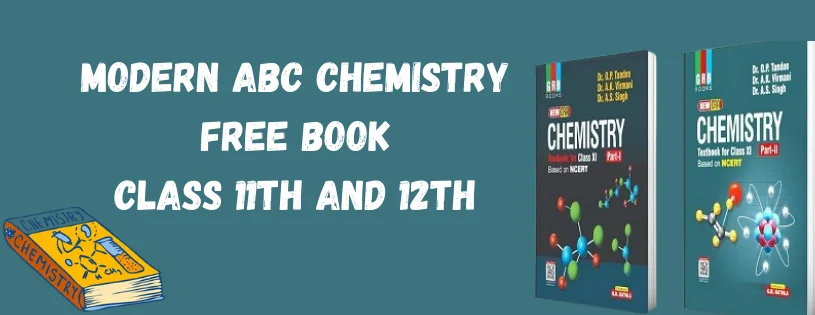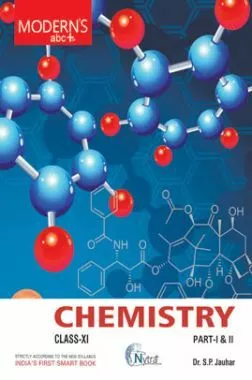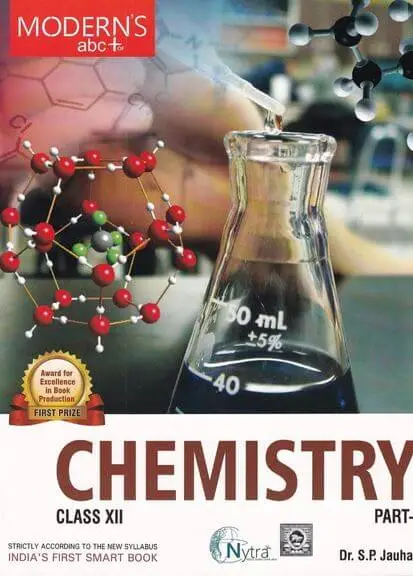Modern ABC Chemistry Free Book Class 11th and 12th
Modern ABC Chemistry Free PDF Book By SP Juhar: This is one of the most demanding chemistry books for all the students who are in grades 11th and 12th. Apart from CBSE students, these Modern ABC Chemistry Book is also followed by aspirants who are preparing for IIT JEE.
This book has a large collection of moderate, difficult, and hardest questions asked in the examination. Along with the Modern ABC Chemistry Book, Modern ABC Physics Book and Modern ABC Mathematics Book you can also practice from Best IIT Preparation Books if you are an engineering aspirant.
The textual material of the book has been delivered in a structured and sequential way, easily understood by the learners to make it learning-friendly in addition to full content coverage, each chapter of the book contains illustrative analysis.
Get JEE Prep Help Download DASA/CIWG E-BOOK
Modern ABC Chemistry Free Book Class 11th and 12th
Modern ABC Chemistry Class 11 Book PDF
This is the most demanding book available free of cost for Indian and NRI students studying in class 11. The modern ABC chemistry class 11 book will help you to prepare for all the important chapters in simple language.
Be ready to crack JEE and other regional engineering entrance examinations. There are 2 books available for class 11
|
Purification, Classification, and Nomenclature of Organic compounds |
Modern ABC Chemistry Class 11- Volume 1 Topics Covered
| Download Chapter Wiise-Topic | Topics Covered |
| Importance and Scope of Chemistry | |
| Laws of chemical combination | |
| Dalton’s atomic theory | |
| Atoms and molecules | |
| Atomic and molecular masses | |
| Mole concept | |
| Molar mass | |
| Percentage composition | |
| Empirical and molecular formula | |
| Chemical reactions | |
| Stoichiometry | |
| Calculations based on stoichiometry | |
| Discovery of Electron | |
| Proton and Neutron | |
| Atomic number | |
| Isotopes and isobars | |
| Thomson’s model and its limitations | |
| Rutherford’s model and its limitations | |
| Bohr’s model and its limitations | |
| de Broglie’s relationship | |
| Heisenberg uncertainty principle | |
| Concept of orbitals | |
| Quantum numbers | |
| Shapes of s, p, and d orbitals | |
| Rules for filling electrons in orbitals | |
| Aufbau principle | |
| Pauli’s exclusion principle | |
| Hund’s rule | |
| Electronic configuration of atoms | |
| Stability of half-filled and completely filled orbitals | |
| Significance and development of periodic table | |
|
Modern periodic law and the present form of the periodic table |
|
| Periodic trends in properties of elements | |
| Atomic radii | |
| Ionic radii | |
| Inert gas radii | |
| Ionization enthalpy | |
| Electrons gain enthalpy | |
| Electronegativity | |
| Valency | |
|
Nomenclature of elements with atomic number greater than 100 |
|
| Valence electrons | |
| Ionic bond | |
| Covalent bond | |
| Bond parameters | |
| Lewis structure | |
| The polar character of covalent bond | |
| The covalent character of ionic bond | |
| Valence bond theory | |
| Resonance | |
| The geometry of covalent molecules | |
| VSEPR theory | |
| Concept of hybridization | |
|
S, p, and d orbitals and shapes of some simple molecules |
|
| Molecular orbital theory | |
| Hydrogen bond | |
| Three states of matter | |
| Intermolecular interactions | |
| Types of bonding | |
| Melting and boiling points | |
|
Role of gas laws in elucidating the concept of the molecule |
|
| Boyle’s law | |
| Charles law | |
| Gay Lussac’s law | |
| Avogadro’s law | |
| Ideal behavior | |
| Empirical derivation of gas equation | |
| Ideal gas equation | |
| Deviation from ideal behavior | |
| Liquefaction of gases | |
| Critical temperature | |
|
Kinetic energy and molecular speeds (elementary idea) |
|
| Liquid State – vapor pressure | |
| Viscosity and surface tension | |
|
Concepts of System and types of systems, surroundings, work, heat, energy, |
|
| Extensive and intensive properties | |
| State functions | |
| The first law of thermodynamics | |
| Internal energy | |
| Enthalpy | |
| Heat capacity | |
| Specific heat | |
| Measurement of ∆U and ∆H | |
| Hess’s law of constant heat summation | |
| Enthalpy of bond dissociation | |
| Combustion, formation, atomization | |
| Sublimation, phase transition, ionization | |
| Solution and dilution | |
| The second law of Thermodynamics (brief introduction) | |
| Introduction of entropy | |
| State function | |
|
Gibb’s energy change for spontaneous and non-spontaneous processes |
|
| Criteria for equilibrium | |
| Third law of thermodynamics (brief introduction). |
Modern ABC Chemistry Class 11- Volume 2 Topics Covered
| Download Chapter-Wise Topic | Topics Covered |
| Equilibrium in physical and chemical processes | |
| Dynamic nature of equilibrium | |
| Law of mass action | |
| Equilibrium constant, factors affecting equilibrium | |
| Le Chatelier’s principle | |
| Ionic equilibrium – | |
| Ionization of acids and bases | |
| Strong and weak electrolytes | |
| Degree of ionization | |
| Ionization of poly basic acids | |
| Acid strength | |
| Concept of pH | |
| Hydrolysis of salts (elementary idea) | |
| Buffer solution | |
| Henderson Equation | |
| Solubility product | |
| Common ion effect (with illustrative examples). | |
| Concept of oxidation and reduction | |
| Redox reactions | |
| Oxidation number | |
|
Balancing redox reactions, in terms of loss and gain of electrons and change in oxidation number |
|
| Applications of redox reactions | |
| Position of hydrogen in periodic table | |
| Occurrence | |
| Isotopes | |
| Preparation, properties of hydrogen | |
| Uses of hydrogen | |
| Hydrides – ionic covalent and interstitial | |
| Physical and chemical properties of water | |
| Heavy water | |
|
Hydrogen peroxide – preparation, reactions and structure and use |
|
| Hydrogen as a fuel | |
|
Group 1 and Group 2 Elements General introduction |
|
| Electronic configuration | |
|
Occurrence, anomalous properties of the first element of each group, diagonal relationship, Trends in the variation of properties (such as ionization enthalpy, atomic and ionic radii) |
|
|
Trends in chemical reactivity with oxygen, water, hydrogen and halogens, uses. |
|
|
Preparation and Properties of Some Important Compounds: |
|
| Sodium Carbonate | |
| Sodium Chloride | |
| Sodium Hydroxide | |
| Sodium Hydrogen carbonate | |
| Biological importance of Sodium and Potassium | |
| Calcium Oxide | |
| Calcium Carbonate and their industrial uses | |
| Biological importance of Magnesium and Calcium. | |
| General Introduction to p -Block Elements | |
| Group 13 Elements: | |
| Boron – physical and chemical properties | |
| Some important compounds: | |
|
Borax, Boric acid, Boron Hydrides, Aluminium: Reactions with acids and alkalis, |
|
| Group 14 Elements: | |
| Carbon-catenation | |
| Allotropic forms | |
| Physical and chemical properties | |
| Uses of some important compounds: Oxides | |
| Important compounds of Silicon and a few uses | |
|
Silicon Tetrachloride, Silicones, Silicates and Zeolites, their uses |
|
| General introduction | |
| Methods of purification | |
| Qualitative analysis | |
| Quantitative analysis | |
|
Classification and IUPAC nomenclature of organic compounds |
|
|
Electronic displacements in a covalent bond: inductive effect, electromeric effect, resonance and hyperconjugation. |
|
|
Homolytic and heterolytic fission of a covalent bond: free radicals, carbocations, carbanions, electrophiles and nucleophiles |
|
| Types of organic reactions | |
| Classification of Hydrocarbons | |
| Aliphatic Hydrocarbons: | |
|
Alkanes – Nomenclature, isomerism, conformation (ethane only), physical properties, chemical reactions including free radical mechanism of halogenation, combustion and pyrolysis. |
|
|
Alkenes – Nomenclature, Structure of double bond (ethene), geometrical isomerism, physical properties, methods of preparation, chemical reactions: addition of hydrogen, halogen, water, hydrogen halides (Markovnikov’s addition and peroxide effect), ozonolysis, oxidation, mechanism of electrophilic addition. |
|
|
Alkynes – Nomenclature, the structure of triple bond (ethyne), physical properties, methods of preparation, chemical reactions: acidic character of alkynes, addition reaction of – hydrogen, halogens, hydrogen halides, and water. |
|
| Aromatic Hydrocarbons: | |
|
Introduction, IUPAC nomenclature, benzene: resonance, aromaticity, chemical properties: mechanism of electrophilic substitution. Nitration, sulphonation, halogenation, Friedel Crafts alkylation and acylation, directive influence of the functional group in monosubstituted benzene. Carcinogenicity and toxicity. |
|
| 14. Environmental Chemistry |
Environmental pollution – air, water, and soil pollution, chemical reactions in the atmosphere, smogs, major atmospheric pollutants, acid rain, ozone and its reactions, effects of depletion of the ozone layer, greenhouse effect, and global warming – pollution due to industrial wastes, green chemistry as an alternative tool for reducing pollution, strategies for control of environmental pollution. |
Free Modern ABC Chemistry Class 12 Book PDF
You can download the Modern ABC Chemistry class 12 part 1 & 2 pdf with one click. Chemistry is the most significant subject among PCM, where JEE aspiring students can get 100 percent of their base in concepts as solid.
Much of the questions in the Chemistry segment are relatively simpler than the other topics in the IIT JEE.
Modern ABC Chemistry for Class 12 book is specially modified for the students who are JEE aspirants. This book also can help you to clear all the basics of JEE Chemistry.
1. Solid State
2. Solutions
3. Electrochemistry
4. Chemical Kinetics
5. Surface Chemistry
6. General Principles and Processes of Isolation of Elements
7. p-Block Elements
8. d- and -Block Elements
9. Coordination Compounds
Modern ABC Chemistry Class 12 Part 2 Topics Covered
10. Haloalkanes and Haloarenes
11. Alcohols, Phenols, and Ethers
12. Aldehydes, Ketones, and Carboxylic Acids
13. Organic Compounds Containing Nitrogen
14. Biomolecules
15. Polymers
16. Chemistry in Everyday Life
Download NRI Prep eBook
Enhance your JEE preparation further by downloading our exclusive NRI Prep eBook. Tailored to cater to the needs of Non-Resident Indian students, this comprehensive guide complements, providing valuable insights and strategies for success. Don't miss out on this essential resource – click to download and elevate your JEE readiness today!

Free Download Notes ABC Chemistry Book Class 11th and 12th
FAQs on Modern ABC Chemistry Book
Q.1) Is Modern ABC Chemistry good for chemistry?
Answer: Yes, Modern Chemistry is one of the best books for competitive examination along with CBSE.
Q.2) Which is better Pradeep or modern ABC for chemistry?
Answer: In terms of book rating Pradeep's Chemistry book is high rating than SP Juhar's chemistry.
Q.3) Is Modern ABC chemistry good for JEE?
Answer: Yes, it's considered one of the best books for JEE Preparation too.
Q.4) What is the price of a Modern ABC chemistry class 11th?
Answer: Online book price of ABC chemistry is around Rs.1600-1800.
Q.5) Does the Modern ABC Chemistry Book cater to competitive exam preparations apart from regular studies?
Answer: Modern ABC Chemistry also offers editions specifically designed for competitive exams like NEET, JEE, and other state-level entrance exams, including practice questions and mock tests.
Q.6) Are the concepts in the Modern ABC Chemistry Book presented in a student-friendly manner?
Answer: The book uses lucid language, concise explanations, and structured content, making it accessible and helpful for students at different levels of understanding.
Q.7) Does the Modern ABC Chemistry Book include solutions or answer keys to practice problems?
Answer: The book often includes solutions or answer keys to select problems, aiding students in verifying their answers and understanding the problem-solving approach.
Q.8) Are there different editions or versions available for the Modern ABC Chemistry Book?
Answer: Modern Publishers release revised editions to keep the content updated with changes in syllabi, incorporating improvements and updated information as needed.
Q.9) Where can I purchase or access the Modern ABC Chemistry Book?
Answer: The book is available at various bookstores, both physical and online. Additionally, it might be available for purchase or download from the Modern Publishers' official website or other online platforms.
Q.10) . Can the Modern ABC Chemistry Book be used as the primary study material for Chemistry?
Answer: While the book is comprehensive, it's advisable to use it alongside classroom notes, reference books, and additional practice materials to get a well-rounded understanding of Chemistry.







